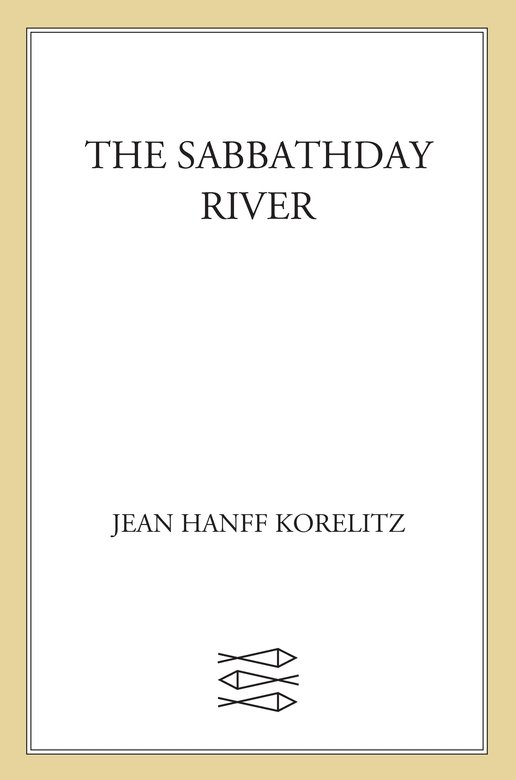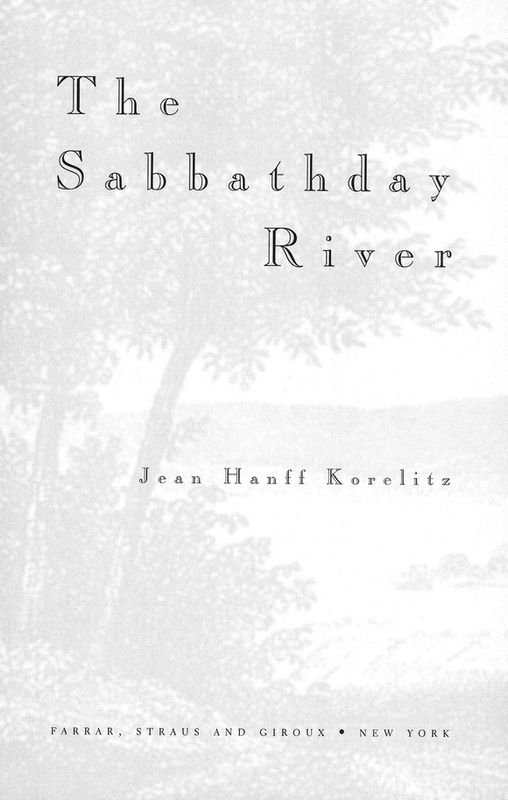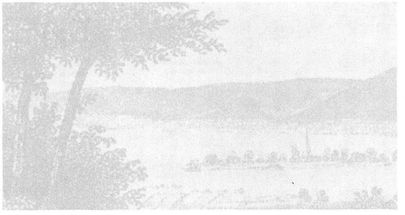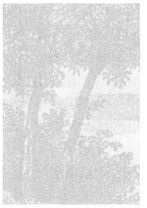The Sabbathday River
Read The Sabbathday River Online
Authors: Jean Hanff Korelitz



Table of Contents
Part 4
-
Mud Season
-
Mud Season
Chapter 28
-
The Farthest Edge of the Diaspora
Chapter 29
-
Theme and Variation
Chapter 30
-
So Help Her God
Chapter 31
-
Friends like These
Chapter 32
-
Some Kind of Paragon
Chapter 33
-
friends Can Quarrel
Chapter 34
-
There Is No Group Here
Chapter 35
-
Witness for the Prosecution
Chapter 36
-
Dost Thou Know Thy Mother Now, Child?'
Chapter 37
-
Horses and Zebras
Chapter 38
-
Medical Oddities
Chapter 39
-
Just Like the Sixties
Chapter 40
-
Some Lives Won't Blend
Chapter 41
-
The Chosen People
Chapter 42
-
Daniel in the Lions' Den
Chapter 43
-
Human Error
Chapter 44
-
Confessions
Chapter 45
-
“I Am Christopher Flynn.”
-
The Farthest Edge of the Diaspora
Chapter 29
-
Theme and Variation
Chapter 30
-
So Help Her God
Chapter 31
-
Friends like These
Chapter 32
-
Some Kind of Paragon
Chapter 33
-
friends Can Quarrel
Chapter 34
-
There Is No Group Here
Chapter 35
-
Witness for the Prosecution
Chapter 36
-
Dost Thou Know Thy Mother Now, Child?'
Chapter 37
-
Horses and Zebras
Chapter 38
-
Medical Oddities
Chapter 39
-
Just Like the Sixties
Chapter 40
-
Some Lives Won't Blend
Chapter 41
-
The Chosen People
Chapter 42
-
Daniel in the Lions' Den
Chapter 43
-
Human Error
Chapter 44
-
Confessions
Chapter 45
-
“I Am Christopher Flynn.”
For Dorothy Aoife
The First Baby

I place my hope on the water
in this little boat
of the language, the way a body might put
an infant
in this little boat
of the language, the way a body might put
an infant
Â
in a basket of intertwined
iris leaves,
its underside proofed
with bitumen and pitch,
iris leaves,
its underside proofed
with bitumen and pitch,
Â
then set the whole thing down amidst
the sedge
and bulrushes by the edge
of a river
the sedge
and bulrushes by the edge
of a river
Â
only to have it borne hither and thither,
not knowing where it might end up;
in the lap, perhaps,
of some Pharaoh's daughter.
not knowing where it might end up;
in the lap, perhaps,
of some Pharaoh's daughter.
Â
âNuala NÃ Dhomhnaill, “The Language
Issue” (translated from the Irish by
Paul Muldoon)
Issue” (translated from the Irish by
Paul Muldoon)
Eye Contact

THE FIRST BABY WAS FOUND EARLY ON A WEEKEND morning in September, 1985, as the whole broad length of the Upper Valley braced for its annual riptide of strangers, and as the first maples on the banks of the Sabbathday River prepared to burst, obligingly, into flame. Naomi Roth found the baby. It rocked in an eddy, bordered by stones, and lay so white and, facedown, so still, that she first registered the object as a child's doll, seamless and albino plastic and tragicallyâto that child, at leastâleft behind here. Eyeing it, she could conjure that child's keening over its loss, over the uniqueness of this particular dollâset so decisively apart from its hundreds of thousands of sexless twins, born from the maternity of their Chinese or Thai assembly line. But then again, this was not the place for children, precisely. Children played downstream at Nate's Landing, where the Sabbathday widened slightly and merged with the Goddard River in its headlong careen south and west toward Vermont. There was a picnic area there, and the Rotary had put in swings a few years back, and a perennially overgrown sandbox where the mothers clustered and their
kids occupied themselves. The water, kept safely away by a low picket fence, made its rumble downstream.
kids occupied themselves. The water, kept safely away by a low picket fence, made its rumble downstream.
But the riverbank where Naomi found the baby was a good mile upstream from that place. Here, its curve through maples and leaning birches was fairly undistinguished, and though the path Naomi sometimes used for jogging did pass here, there was nothing remarkable about this particular stretch. The nearest landmarkâand it was a pitifully local landmark at thatâwas the protrusion of boulders around the bend she had just passed, known familiarly as the Drumlins for the little hills of glassy water they made. Pretty, but lethal, since under that glassy water were rocks sharp as real glass. Who would let a child young enough to cherish that doll climb and wade around here?
Naomi stopped then. Grasping her knees, she put her head down and felt the blood rush to her forehead. She was not a very devoted runner. The temptation to stop was always with her, like a blackfly worrying the flank of a horse. The rasp of her breath overwhelmed the rustle of leaves. She felt the heat in her face begin to throb. Naomi glared at the doll, holding it responsible.
Or not this doll, exactly, but the one it was prodding her to fixate onâa specific childhood trauma, happily undisturbed in its thirty-year slumber but now assailing her with disconcerting immediacy.
Stop this,
she thought, but she had already slipped away from herself and the doll was upon her, and how much she had desired it, and how much, for how brief a time, she had adored it. She saw, freshly, the two blond little girls in smocked dresses on the television commercial; she could hear the happy jingle extolling the doll's mind-bending ability to wet. And her name:
Sallie Smiles
! (The exclamation mark thoughtfully provided by the manufacturer.) Naomi Roth's parentsâthey of the Little Red School House and Pete Seeger persuasionâhad been horrified, naturally enough, but she must have had her fill of ant farms and nonsexist creative discovery objects. The small blond pixies on the television were the company she kept in her fantasy of the parallel childhood she was not leading. She coveted the doll.
Stop this,
she thought, but she had already slipped away from herself and the doll was upon her, and how much she had desired it, and how much, for how brief a time, she had adored it. She saw, freshly, the two blond little girls in smocked dresses on the television commercial; she could hear the happy jingle extolling the doll's mind-bending ability to wet. And her name:
Sallie Smiles
! (The exclamation mark thoughtfully provided by the manufacturer.) Naomi Roth's parentsâthey of the Little Red School House and Pete Seeger persuasionâhad been horrified, naturally enough, but she must have had her fill of ant farms and nonsexist creative discovery objects. The small blond pixies on the television were the company she kept in her fantasy of the parallel childhood she was not leading. She coveted the doll.
When it disappeared, less than a week after her birthday, she had waited before panicking. Then she approached her parents, whose unmistakable relief over her carelessnessâthe carelessness they assumed, despite her denialsâwas clear. Naomi's older brother declined to shed light on the situation, but months afterward it was from his window that
she saw her doll again, grimy in city filth on the roof of the apartment building next door. It lay on its stomach against the asphalt, its bright face obscured, its fleshy pink hue bleached to stark white, and the legs between which it had wet so endearingly splayed to the extent of its somewhat limited hip sockets. At that moment, long before mortality and years before sex would enter her ken, she experienced a primitive understanding of the terrifying and the obscene. This tiny, blanched, and helpless body: a distilled drop of pure horror, fallen from the sky to splatter within view of her childhood home as a warning of what adulthood held in store.
she saw her doll again, grimy in city filth on the roof of the apartment building next door. It lay on its stomach against the asphalt, its bright face obscured, its fleshy pink hue bleached to stark white, and the legs between which it had wet so endearingly splayed to the extent of its somewhat limited hip sockets. At that moment, long before mortality and years before sex would enter her ken, she experienced a primitive understanding of the terrifying and the obscene. This tiny, blanched, and helpless body: a distilled drop of pure horror, fallen from the sky to splatter within view of her childhood home as a warning of what adulthood held in store.
Naomi Roth shook her head. The thing in the river was some child's missing toy, after all, not a Proustian moment dropped from the clouds. It had probably been lost hold of upstream and then drifted down here, she thought, taking a tentative first step onto one of the boulders: an accident and a force of nature working in hardly malevolent partnership, and not an invitation to moan about unresolved childhood trauma. At some point, a banana just had to be a banana again, and a doll just a doll, otherwise what's the point?
Farther out, the rocks were slippery with moss. She picked her way on all fours, inching ahead as in a game of Twister, with the silvery and frigid water hissing and sputtering at her heels. Drawing nearer to the white gleam of the doll, caught in its eddy between dark stones, she touched the green sludge of the rock near its smooth white leg and felt a preemptive chill. Cold, Naomi thought. She felt her lips move and realized she'd spoken aloud. But why? “Cold,” she said again, this time making a joke of it. But it was, wasn't it? Suddenly cold? She should look up, really, see if clouds had gathered, if it looked like rain, here, in the middle of her morning run, with only her shorts and a thin T-shirt on and a good two miles to go before the path gave out onto the road where she had left her car. But looking up would mean taking her eyes off the doll, and Naomi could not seem to take her eyes off the doll.
The leg of the doll. A strand of vegetation wedged into the crease behind its knee and fluttering in the glassy water. That joint was stiff, perhaps, but not unyielding, ultimately, since she could see that it gave just slightly in the current, and at its side the brief fingers seemed to feather the water.
Realistic,
Naomi thought, by now aware of the hysteria edging nearer, the strain of pushing it back. And in the barely perceptible
sway of the doll's lower back, where its spindly midsection suddenly widened into a cherubic bottom, a vortex of three dark hairs fluttered below the surface. The doll's shoulder blades uneven, one ridge more sharp than the other, as if the mold had been made deliberately lopsided, the doll's wisps of unglamorous dark hair riding the surface of the water, the doll's eyes â¦
Realistic,
Naomi thought, by now aware of the hysteria edging nearer, the strain of pushing it back. And in the barely perceptible
sway of the doll's lower back, where its spindly midsection suddenly widened into a cherubic bottom, a vortex of three dark hairs fluttered below the surface. The doll's shoulder blades uneven, one ridge more sharp than the other, as if the mold had been made deliberately lopsided, the doll's wisps of unglamorous dark hair riding the surface of the water, the doll's eyes â¦
Open, Naomi knew, though she could not see its face, wedged against its crown of river stones. Open eyes, baffled at whatever great force would summon it here only to show it this frigid and unchanging vision. Only this! She touched its shoulder and felt its newness, even in death. She was gripped now. Something had her about the lungs; some cold thing had infested her, making her grope for the tiny, splayed, and forsaken body in the river. Naomi reached for one alabaster limb and, touching it, felt the burn of a frozen thing. She turned it over then, setting her jaw against its flash of white. The word “bloodless” was forming in her throat. The flesh was smoothly pristine but for a single puckered interruption where something had bored, leaving the same kind of queer, unembellished wound you saw in medieval paintings of Christ âone dainty drop of precious blood spilled from a Roman gash. A girl. Naomi's cheek scratched a granite boulder as she lost her balance. Her own hand finding her belly, her belly heaving onto the surface. Her eyes closing now, then opening, but underwater, too, as if she had only wanted to see what the baby had seen in its long ebb here, with its granite-gray eyes that hadn't had a chance to turn, and she wondered, vaguely, what color they might have become, had they always looked out with such hope as they did now, fixing the awful affront of this radiant sky with a stare Naomi could not bring herself to meet.
Other books
Biker Bait: The Lost Souls MC Series by Hunter, Ellie R
Relentless by Cindy Stark
Bleeding Love by Ashley Andrews
Frozen Teardrop by Lucinda Ruh
21 Days in October by Magali Favre
Foreigner by Robert J Sawyer
Highland Dragon by Kimberly Killion
The Infinite Evolution - Conversion by Erik Johnson
Insignia by Kelly Matsuura
Reluctantly in Love by Niecey Roy